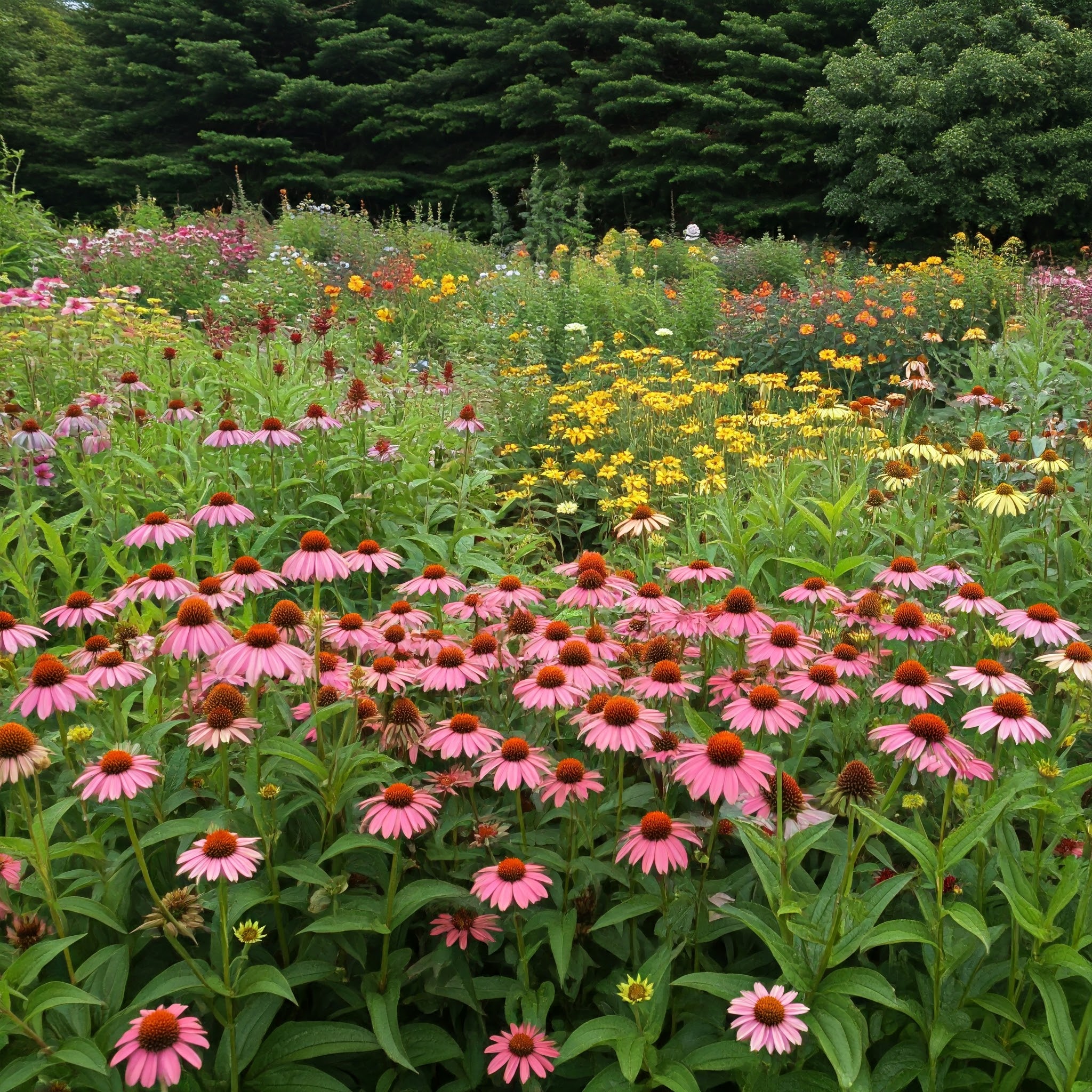Key Takeaways:
| Feature | Benefit |
|---|---|
| Safe for people, pets, and beneficial insects | No harsh chemicals to worry about |
| Promotes healthy soil | Encourages microbial activity and nutrient cycling |
| Sustainable approach | Doesn’t harm the environment in the long run |
| Effective weed management | Various techniques to control unwanted plants |
| May require more effort and patience compared to herbicides | A rewarding and eco-friendly alternative |
Keeping your garden free of pesky weeds is an ongoing battle. But ditch the harsh chemicals! Organic weed control offers a safe, sustainable, and effective way to manage unwanted plants while promoting a healthy ecosystem in your flower beds, lawns, or vegetable patches.
Understanding Organic Weed Control
Organic weed control is a philosophy that prioritizes natural methods for managing weeds. Unlike chemical herbicides, which can harm beneficial insects and pollute the environment, organic methods focus on disrupting weed lifecycles and promoting a healthy balance in your garden.
Here’s a breakdown of how organic weed control works:
- Prevention: Techniques like mulching, crop rotation, and maintaining healthy soil discourage weed seed germination and growth.
- Suppression: Methods like hand-pulling, smothering, and using natural weed killers directly target existing weeds, preventing them from spreading.
- Competition: Encouraging vigorous plant growth and using cover crops creates a competitive environment, making it harder for weeds to establish themselves.
Benefits of Organic Weed Control
There are many advantages to choosing organic weed control over chemical solutions:
- Safe for People, Pets, and Beneficial Insects: No harmful chemicals mean a safer environment for you, your family, and your garden’s helpful inhabitants like ladybugs and bees.
- Promotes Healthy Soil: Organic methods encourage healthy microbial activity in the soil, leading to better nutrient cycling and overall soil health for your desired plants.
- Sustainable Approach: By avoiding chemicals, you’re contributing to a healthier environment and preventing potential water contamination.
- Long-Term Solution: Organic methods address the root causes of weed problems, leading to more sustainable weed control in the long run.
Popular Organic Weed Control Methods
There’s a range of techniques you can use to tackle unwanted plants organically. Here are some popular methods:
Mulching
Mulching your garden beds with organic materials like bark chips, straw, or shredded leaves provides several benefits:
- Suppresses weed growth by blocking sunlight and preventing weed seeds from germinating.
- Retains soil moisture, reducing the need for frequent watering and promoting healthy plant growth.
- Breaks down over time, adding valuable organic matter and nutrients to the soil.
Pros: Easy to apply, long-lasting, improves soil health.
Cons: Requires an initial investment in mulch materials.
Hand-Pulling
This classic method is a great option for small weed infestations or removing stubborn weeds that resist other techniques.
Pros: Effective for targeted weed removal, allows for quick identification of new weeds.
Cons: Can be time-consuming for larger areas, requires regular attention.
Smothering
Smothering deprives weeds of sunlight, hindering their growth. Here are a few ways to achieve this:
- Cardboard: Lay down cardboard around desired plants, overlapping edges to prevent light penetration. Cover with mulch for aesthetics.
- Newspapers: Similar to cardboard, use newspaper sheets as a weed barrier, again topped with mulch. (Opt for uncoloured, non-glossy newspapers if possible).
- Living Mulches: Plant fast-growing, low-growing groundcovers like creeping thyme or clover to compete with weeds and suppress their growth.
Pros: Effective for both preventing and controlling weeds, readily available materials.
Cons: Cardboard and newspapers may break down quickly, requiring replacement. Living mulches might need occasional trimming.
Natural Weed Killers
For stubborn weeds, consider these natural concoctions:
- Vinegar Spray: A 20% white vinegar solution (diluted with water) can effectively target broadleaf weeds. Spray directly on the leaves, avoiding desired plants. (Note: vinegar can kill nearby plants if not careful)
- Boiling Water: Carefully pour boiling water directly onto weeds to kill them. This method is best suited for individual weeds on patios or paths. (Caution: Be careful to avoid burns)
- Cornmeal Gluten: This corn-derived product acts as a pre-emergent weed control, preventing weed seeds from germinating when applied to bare soil.
Pros: Relatively inexpensive, readily available ingredients.
Cons: Vinegar can harm nearby plants, boiling water poses a burn risk, cornmeal gluten needs to be reapplied regularly.
Choosing the Right Organic Weed Control Method
The best organic weed control method for you depends on several factors:
- Type of weeds: Different weeds respond differently to treatments. Broadleaf weeds may be susceptible to vinegar spray, while grassy weeds require different solutions.
- Severity of infestation: For a few scattered weeds, hand-pulling might suffice. Larger infestations might benefit from a combination of techniques.
- Time and effort: Some methods like mulching require minimal effort, while hand-pulling or applying natural weed killers can be more time-consuming.
Here’s a handy table to help you choose the right method:
| Weed Type | Organic Control Methods |
|---|---|
| Broadleaf Weeds | Hand-pulling, smothering (cardboard, newspaper), vinegar spray |
| Grasses | Hand-pulling, smothering, cornmeal gluten (pre-emergent) |
| Annual Weeds | Mulching, hand-pulling, maintaining healthy soil |
| Perennial Weeds | Hand-pulling (repeatedly), smothering for extended periods |
Remember: Consistency is key with organic weed control. Regularly monitor your garden, remove weeds promptly, and use a combination of methods for optimal results.
Enhancing Your Organic Weed Control Strategy
Here are some additional tips to boost the effectiveness of your organic weed control efforts:
- Promote healthy soil: Rich, healthy soil fosters strong plant growth, making it harder for weeds to establish themselves. Use compost, composted manure, or organic fertilizers to nourish your soil.
- Encourage beneficial insects: Ladybugs, lacewings, and other beneficial insects are natural predators of many garden pests, including weeds. Provide them with habitat by planting a variety of flowering plants and avoiding broad-spectrum pesticides.
- Practice crop rotation: Rotating the crops you plant in a specific area disrupts weed lifecycles and helps prevent nutrient depletion in the soil.
- Cleanliness: Regularly remove weeds from paths and walkways to prevent them from spreading to desired planting areas.
Living with a Weed-Free (Almost) Garden
Organic weed control is a long-term commitment. While it may require more effort and patience compared to chemical herbicides, the benefits are well worth it. You’ll be creating a healthy and vibrant ecosystem for your desired plants, promoting beneficial insects, and doing your part for the environment. Remember, a few persistent weeds here and there are a natural part of any garden. Embrace the imperfections and enjoy the satisfaction of cultivating a beautiful and healthy space using natural methods.





